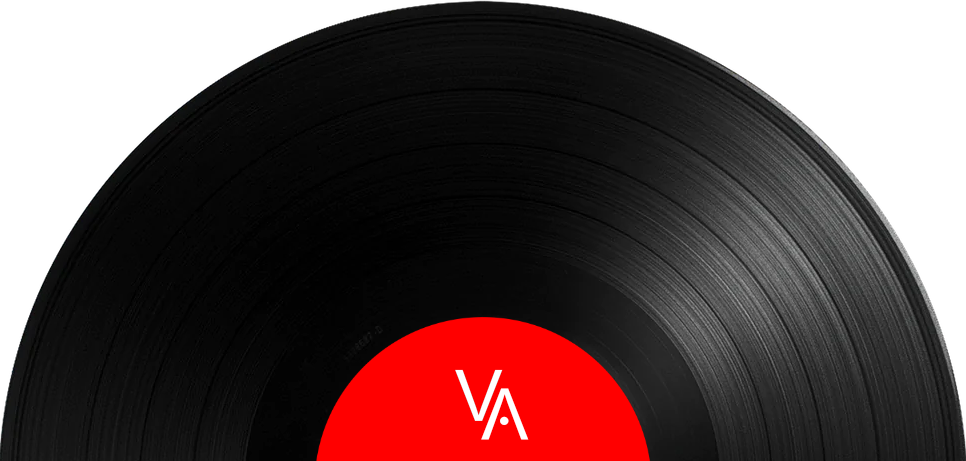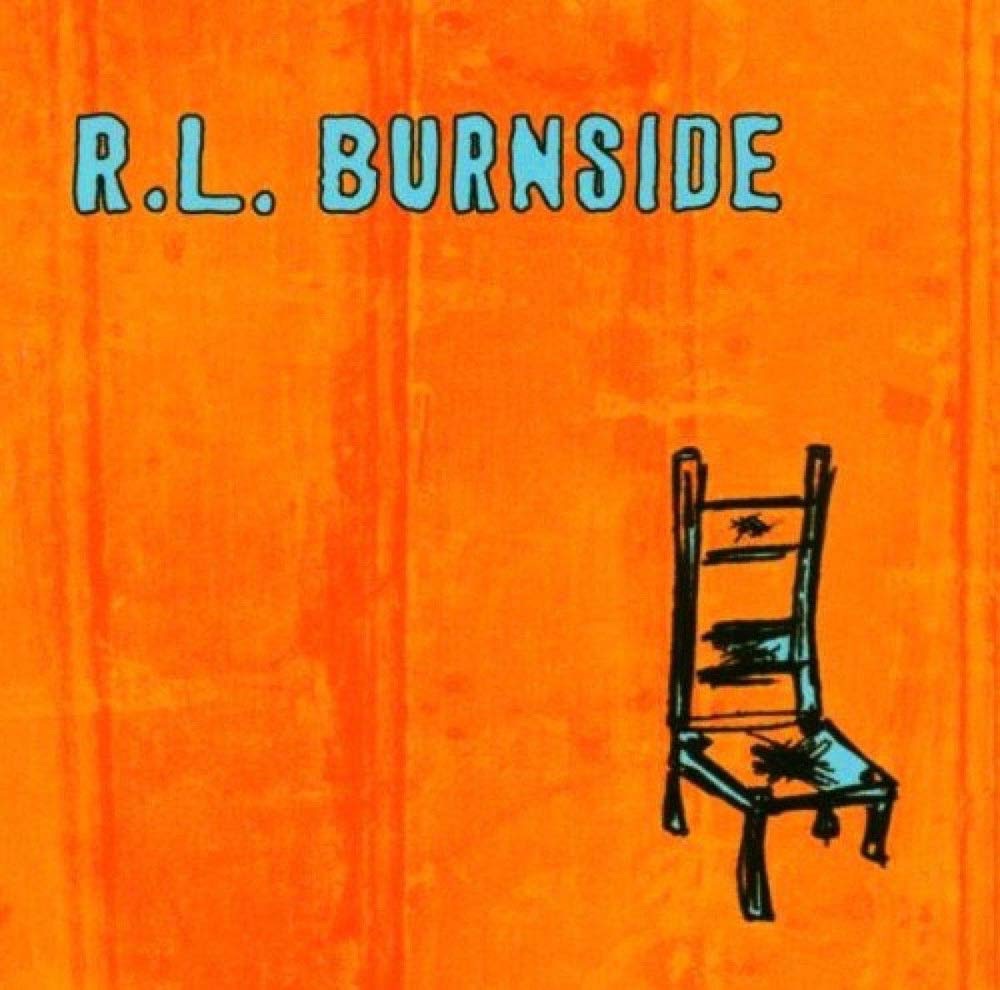
Unlike some people, I really dig this record! Real delta blues with a modern DJ-ish twist.
R.L. Burnside came to success out of nowhere after decades of wallowing in obscurity to enjoy what must surely qualify as one of the most unexpected final acts of any musician's life - especially for such a bluesman as he was! His later-life success was largely attributable to the 1991 film, Deep Blues, in which director Robert Mugge and music writer Robert Palmer set out to find real, authentic blues music. This led them to the deep south and Burnside, whom the film exposed to a much wider audience than he probably ever imagined would hear his music. Until then, he was just sittin' on his porch strumming his guitar.
That's most likely where I first encountered him, and I recall really liking the titles of his recordings when I went looking for them after seeing the film - Ass Pocket Full Of Whiskey, probably being my favourite. What a great title! I really like blues music and I just knew there was something special in Burnside - something completely different - and started to collect his records. This guy's music is as raw as blues gets, and he was just as raw as the music he played.
And he wasn't faking it, either.
As the years progressed and he became more well known - and his recording budget increased - he was able to play around with the production of his music, resulting in some interesting songs and arrangements that otherwise would never have been realized. The second track on this album, Got Messed Up, employs scratches, loops and other DJ-type flourishes that no real bluesman would ever employ. Except Burnside was a real bluesman, and he did employ them. It messed up, but it works.
One of my favourite tracks on this record is Too Many Ups. "You got the ketchup, you got the hook up 'cause you wanna get paid up," Burnside sings. "Too many ups, too many ups, too many upside downs." Guitar swirls around the words over a danceable beat. Then he asks himself, "What do you mean too many upside downs?" It's infectious. It's weird. It's playful. It's wonderful.
Wish I Was In Heaven Sitting Down - another great title for a record from an old bluesman - is the second last recording Burnside would release and it attempts to broaden his audience, at which it more-or-less succeeds (although blues purists tend to hate it). But I like it's funky dance grooves and loops and I give Burnside a lot of credit for letting it happen. He didn't want to do it, not at first. He thought it was a silly idea but in the end relented and let his producer have his way, and the result was unlike any other recording issued by any other real bluesman. There are some really interesting moments, like the wonderfully quirky version of Chain Of Fools. Burnside is way out of his depth singing soul music, but that's what makes him so damned cool, too! It sort of works and I really like it.
As much as I like real, unadulterated blues music (Lightnin' Hopkins, Johnny Shines, Mississippi Fred McDowell, Little Walter, et al) I also have a deep appreciation for stuff that's interesting and different and off the beaten path - and this record fills both buckets almost to the brim! Mugge and Palmer probably never could have imagined that the bluesman they discovered on some back porch somewhere would ever release a record like this. Gangsta' blues? Maybe. Burnside does have real gangsta' cred (see the Bonus Track for details).
Burnside found success due to luck as much as anything else. His sound was as raw as it gets - too raw, probably, for most record contract signer-uppers. But then along came Deep Blues and everything changed. Just like that he became a sought after and respected bluesman, although none of it would have been possible without the tight embrace of Deep Blues. This album, or the terrific experimental remix vibe of its predecessor, Come On In, would never have been possible without the post-documentary success he achieved. Guest collaborators such as Jon Spencer (on the Ass Pocket Full Of Whiskey LP) would never have materialized because Burnside wouldn't have had an aura of cool hovering over him. He would have just been another bluesman, one of a dying breed.
This album is a bit different from the ones that preceded it. For one thing, Burnside doesn't play guitar on it. Secondly, it's stylistically all over the map. My Eyes Keep Me In Trouble envelops his voice in a wash of mandolins - seriously! - the type of song I can easily imagine Levon Helm guesting on. To be truthful, that pairing seems like such a natural fit that I'm kind of curious as to why Helm wasn't asked.
By the time this album was released, in 2000, Burnside's health had been in decline for several years. Heart trouble. He was still performing, but only occasionally, although he continued to record. His unique style - just a guitar and drums - was unpolished, hypnotic and LOUD! Completely unadorned, and I cannot over-emphasize how this man's music would have gone unnoticed had Mugge and Palmer not found him for their movie.
Burnside's admirers included Jon Spencer, Sonic Youth and Beck, among several others. This, in turn, introduced him to their audiences, who saw him perform in the rock clubs he preferred over the blues festivals of the day, which he thought were a time consuming bore. His records became college radio staples and hip-hop artists remixed his songs (seriously … check out Come On In). Burnside was not always reliable and would sometimes miss gigs in order to go fishing - but when he did take the stage his performances remained as they had for decades in back-county juke joints: unpolished and unadorned, just him and his guitar and (usually) his grandson, Cedric Burnside, on drums.
To hear what Burnside sounded like live, the closest you'll get is the 2001 live album, Burnside On Burnside, recorded on the western leg of what would be his final tour. It's raw - really raw - and you can hear the man crack jokes as he drinks whiskey between songs and delivers his signature, "Well, well, well," again and again.
On the afternoon of his final Los Angeles concert on that tour his record label set up a photo shoot, something Burnside had little patience for. But this one was a different. It was for Hustler magazine, so he relented and showed up with a bottle of whiskey and sat grinning ear-to-ear for two hours while two beautiful and completely naked young women sat on his knee and ran their fingers through his hair while the camera collected the evidence.
Burnside lived the blues and this record is a good and interesting example of a man bridging generations. It's not perfect, but it's not supposed to be. And that makes it a great listen. And …
Unlike some people, I really dig this record! Real delta blues with a modern DJ-ish twist.
R.L. Burnside came to success out of nowhere after decades of wallowing in obscurity to enjoy what must surely qualify as one of the most unexpected final acts of any musician's life - especially for such a bluesman as he was! His later-life success was largely attributable to the 1991 film, Deep Blues, in which director Robert Mugge and music writer Robert Palmer set out to find real, authentic blues music. This led them to the deep south and Burnside, whom the film exposed to a much wider audience than he probably ever imagined would hear his music. Until then, he was just sittin' on his porch strumming his guitar.
That's most likely where I first encountered him, and I recall really liking the titles of his recordings when I went looking for them after seeing the film - Ass Pocket Full Of Whiskey, probably being my favourite. What a great title! I really like blues music and I just knew there was something special in Burnside - something completely different - and started to collect his records. This guy's music is as raw as blues gets, and he was just as raw as the music he played.
And he wasn't faking it, either.
As the years progressed and he became more well known - and his recording budget increased - he was able to play around with the production of his music, resulting in some interesting songs and arrangements that otherwise would never have been realized. The second track on this album, Got Messed Up, employs scratches, loops and other DJ-type flourishes that no real bluesman would ever employ. Except Burnside was a real bluesman, and he did employ them. It messed up, but it works.
One of my favourite tracks on this record is Too Many Ups. "You got the ketchup, you got the hook up 'cause you wanna get paid up," Burnside sings. "Too many ups, too many ups, too many upside downs." Guitar swirls around the words over a danceable beat. Then he asks himself, "What do you mean too many upside downs?" It's infectious. It's weird. It's playful. It's wonderful.
Wish I Was In Heaven Sitting Down - another great title for a record from an old bluesman - is the second last recording Burnside would release and it attempts to broaden his audience, at which it more-or-less succeeds (although blues purists tend to hate it). But I like it's funky dance grooves and loops and I give Burnside a lot of credit for letting it happen. He didn't want to do it, not at first. He thought it was a silly idea but in the end relented and let his producer have his way, and the result was unlike any other recording issued by any other real bluesman. There are some really interesting moments, like the wonderfully quirky version of Chain Of Fools. Burnside is way out of his depth singing soul music, but that's what makes him so damned cool, too! It sort of works and I really like it.
As much as I like real, unadulterated blues music (Lightnin' Hopkins, Johnny Shines, Mississippi Fred McDowell, Little Walter, et al) I also have a deep appreciation for stuff that's interesting and different and off the beaten path - and this record fills both buckets almost to the brim! Mugge and Palmer probably never could have imagined that the bluesman they discovered on some back porch somewhere would ever release a record like this. Gangsta' blues? Maybe. Burnside does have real gangsta' cred (see the Bonus Track for details).
Burnside found success due to luck as much as anything else. His sound was as raw as it gets - too raw, probably, for most record contract signer-uppers. But then along came Deep Blues and everything changed. Just like that he became a sought after and respected bluesman, although none of it would have been possible without the tight embrace of Deep Blues. This album, or the terrific experimental remix vibe of its predecessor, Come On In, would never have been possible without the post-documentary success he achieved. Guest collaborators such as Jon Spencer (on the Ass Pocket Full Of Whiskey LP) would never have materialized because Burnside wouldn't have had an aura of cool hovering over him. He would have just been another bluesman, one of a dying breed.
This album is a bit different from the ones that preceded it. For one thing, Burnside doesn't play guitar on it. Secondly, it's stylistically all over the map. My Eyes Keep Me In Trouble envelops his voice in a wash of mandolins - seriously! - the type of song I can easily imagine Levon Helm guesting on. To be truthful, that pairing seems like such a natural fit that I'm kind of curious as to why Helm wasn't asked.
By the time this album was released, in 2000, Burnside's health had been in decline for several years. Heart trouble. He was still performing, but only occasionally, although he continued to record. His unique style - just a guitar and drums - was unpolished, hypnotic and LOUD! Completely unadorned, and I cannot over-emphasize how this man's music would have gone unnoticed had Mugge and Palmer not found him for their movie.
Burnside's admirers included Jon Spencer, Sonic Youth and Beck, among several others. This, in turn, introduced him to their audiences, who saw him perform in the rock clubs he preferred over the blues festivals of the day, which he thought were a time consuming bore. His records became college radio staples and hip-hop artists remixed his songs (seriously … check out Come On In). Burnside was not always reliable and would sometimes miss gigs in order to go fishing - but when he did take the stage his performances remained as they had for decades in back-county juke joints: unpolished and unadorned, just him and his guitar and (usually) his grandson, Cedric Burnside, on drums.
To hear what Burnside sounded like live, the closest you'll get is the 2001 live album, Burnside On Burnside, recorded on the western leg of what would be his final tour. It's raw - really raw - and you can hear the man crack jokes as he drinks whiskey between songs and delivers his signature, "Well, well, well," again and again.
On the afternoon of his final Los Angeles concert on that tour his record label set up a photo shoot, something Burnside had little patience for. But this one was a different. It was for Hustler magazine, so he relented and showed up with a bottle of whiskey and sat grinning ear-to-ear for two hours while two beautiful and completely naked young women sat on his knee and ran their fingers through his hair while the camera collected the evidence.
Burnside lived the blues and this record is a good and interesting example of a man bridging generations. It's not perfect, but it's not supposed to be. And that makes it a great listen. And …



